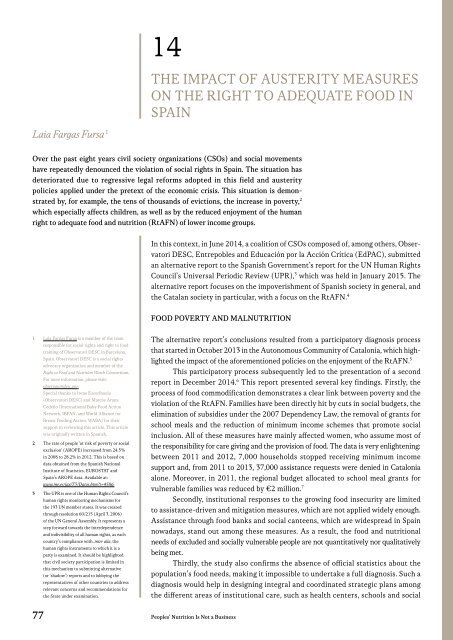RIGHT TO FOOD AND NUTRITION WATCH
1iNBHTY
1iNBHTY
Create successful ePaper yourself
Turn your PDF publications into a flip-book with our unique Google optimized e-Paper software.
14<br />
THE IMPACT OF AUSTERITY MEASURES<br />
ON THE <strong>RIGHT</strong> <strong>TO</strong> ADEQUATE <strong>FOOD</strong> IN<br />
SPAIN<br />
Laia Fargas Fursa 1<br />
Over the past eight years civil society organizations (CSOs) and social movements<br />
have repeatedly denounced the violation of social rights in Spain. The situation has<br />
deteriorated due to regressive legal reforms adopted in this field and austerity<br />
policies applied under the pretext of the economic crisis. This situation is demonstrated<br />
by, for example, the tens of thousands of evictions, the increase in poverty, 2<br />
which especially affects children, as well as by the reduced enjoyment of the human<br />
right to adequate food and nutrition (RtAFN) of lower income groups.<br />
In this context, in June 2014, a coalition of CSOs composed of, among others, Observatori<br />
DESC, Entrepobles and Educación por la Acción Crítica (EdPAC), submitted<br />
an alternative report to the Spanish Government’s report for the UN Human Rights<br />
Council’s Universal Periodic Review (UPR), 3 which was held in January 2015. The<br />
alternative report focuses on the impoverishment of Spanish society in general, and<br />
the Catalan society in particular, with a focus on the RtAFN. 4<br />
<strong>FOOD</strong> POVERTY <strong>AND</strong> MAL<strong>NUTRITION</strong><br />
1 Laia Fargas Fursa is a member of the team<br />
responsible for social rights and right to food<br />
training of Observatori DESC in Barcelona,<br />
Spain. Observatori DESC is a social rights<br />
advocacy organization and member of the<br />
Right to Food and Nutrition Watch Consortium.<br />
For more information, please visit:<br />
observatoridesc.org.<br />
Special thanks to Irene Escorihuela<br />
(Observatori DESC) and Marcos Arana<br />
Cedeño (International Baby Food Action<br />
Network, IBFAN, and World Alliance for<br />
Breast Feeding Action, WABA) for their<br />
support in reviewing this article. This article<br />
was originally written in Spanish.<br />
2 The rate of people ‘at risk of poverty or social<br />
exclusion’ (AROPE) increased from 24.5%<br />
in 2008 to 28.2% in 2012. This is based on<br />
data obtained from the Spanish National<br />
Institute of Statistics, EUROSTAT and<br />
Spain’s AROPE data. Available at:<br />
www.ine.es/jaxiT3/Datos.htm?t=4586.<br />
3 The UPR is one of the Human Rights Council’s<br />
human rights monitoring mechanisms for<br />
the 193 UN member states. It was created<br />
through resolution 60/215 (April 3, 2006)<br />
of the UN General Assembly. It represents a<br />
step forward towards the interdependence<br />
and indivisibility of all human rights, as each<br />
country’s compliance with, inter alia, the<br />
human rights instruments to which it is a<br />
party is examined. It should be highlighted<br />
that civil society participation is limited in<br />
this mechanism to submitting alternative<br />
(or ‘shadow’) reports and to lobbying the<br />
representatives of other countries to address<br />
relevant concerns and recommen dations for<br />
the State under examination.<br />
77<br />
The alternative report’s conclusions resulted from a participatory diagnosis process<br />
that started in October 2013 in the Autonomous Community of Catalonia, which highlighted<br />
the impact of the aforementioned policies on the enjoyment of the RtAFN. 5<br />
This participatory process subsequently led to the presentation of a second<br />
report in December 2014. 6 This report presented several key findings. Firstly, the<br />
process of food commodification demonstrates a clear link between poverty and the<br />
violation of the RtAFN. Families have been directly hit by cuts in social budgets, the<br />
elimination of subsidies under the 2007 Dependency Law, the removal of grants for<br />
school meals and the reduction of minimum income schemes that promote social<br />
inclusion. All of these measures have mainly affected women, who assume most of<br />
the responsibility for care giving and the provision of food. The data is very enlightening:<br />
between 2011 and 2012, 7,000 households stopped receiving minimum income<br />
support and, from 2011 to 2013, 37,000 assistance requests were denied in Catalonia<br />
alone. Moreover, in 2011, the regional budget allocated to school meal grants for<br />
vulnerable families was reduced by €2 million. 7<br />
Secondly, institutional responses to the growing food insecurity are limited<br />
to assistance-driven and mitigation measures, which are not applied widely enough.<br />
Assistance through food banks and social canteens, which are widespread in Spain<br />
nowadays, stand out among these measures. As a result, the food and nutritional<br />
needs of excluded and socially vulnerable people are not quantitatively nor qualitatively<br />
being met.<br />
Thirdly, the study also confirms the absence of official statistics about the<br />
population’s food needs, making it impossible to undertake a full diagnosis. Such a<br />
diagnosis would help in designing integral and coordinated strategic plans among<br />
the different areas of institutional care, such as health centers, schools and social<br />
Peoples’ Nutrition Is Not a Business


